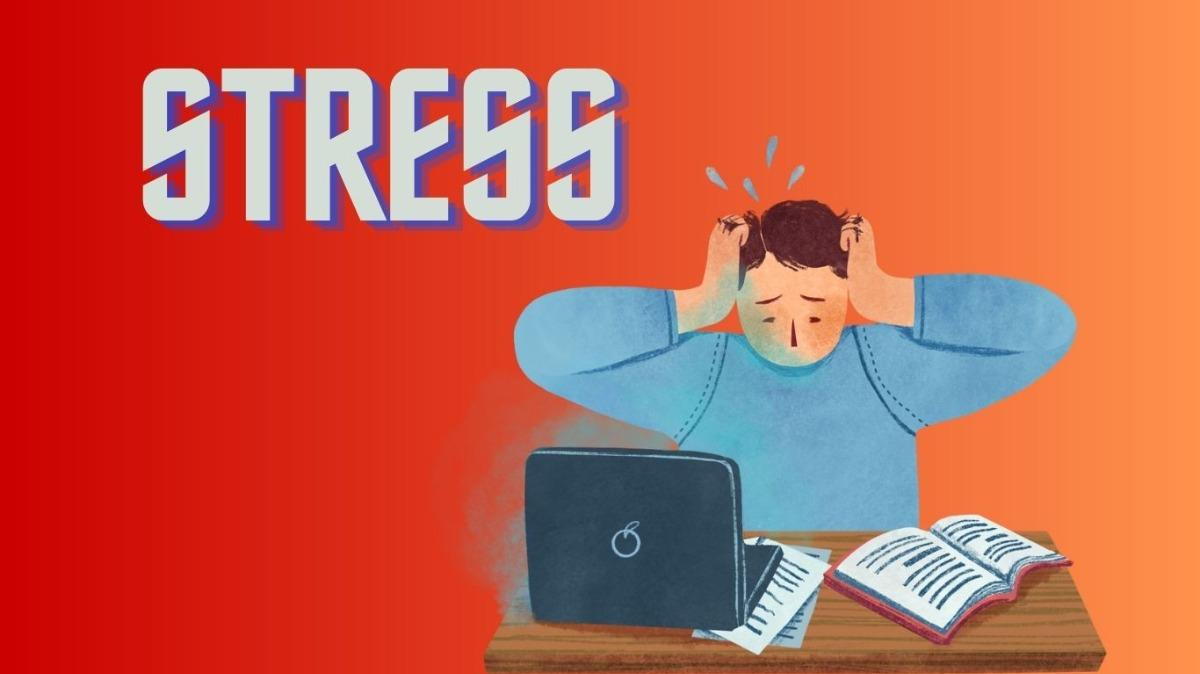Are You Stressed?

- posted: Apr. 14, 2023
…Who isn’t stressed?! Why do we even have stress in the first place? Stress is our body’s natural physical or mental reaction to challenging events. It is how we get the energy and motivation to study for the upcoming test. Or how we gain the ability to run away from a barking dog that’s chasing you. Stress causes our bodies to release a hormone called cortisol that gives us the ability to perform these difficult tasks. In the short-term, stress is helpful. On the other hand, long-term and uncontrolled stress can be harmful to our overall health.
Cortisol increases our heart rate, blood pressure, and blood sugar levels. If these measures are elevated for prolonged periods of time it can be detrimental to our health and even lead to a heart attack or stroke. Therefore it is important to recognize the signs of stress and develop healthy ways of coping. Everyone’s experience with stress is unique. Certain events can cause some people stress but not others. The symptoms of stress are also different for everyone. Here are some of the common manifestations of stress:
Chest pain or feeling like your heart is racing
Mind is racing, difficulty concentrating
Headaches
Muscle tension
High blood pressure
Stomach or digestive problems
Poor appetite or overeating
Exhaustion or trouble sleeping
Irregular or painful periods
Irritability and moodiness
These symptoms may sound familiar to a lot of us. But children can experience stress as well and they are less likely able to recognize these feelings and understand what they mean. Parents and caregivers can recognize the signs and help children manage their stress in a healthy manner. Below are examples of ways you can reduce stress:
Take care of yourself
Eat healthy, exercise regularly, get enough sleep
Find stress-relieving hobbies
Share your problems and worries with those you trust (family, friends, or pediatrician)
Avoid unhealthy coping strategies: poor appetite or overeating, sleeping too much or too little, smoking, alcohol, drugs
Don’t be afraid to ask for help from a counselor or therapist
Counseling Resources on Maui (no referral needed):
Maui Counseling Group (808-249-2121)
Wellness Partners Hawaii (808-379-6656)
Crisis Line 1-800-753-6879

- posted: Apr. 14, 2023
…Who isn’t stressed?! Why do we even have stress in the first place? Stress is our body’s natural physical or mental reaction to challenging events. It is how we get the energy and motivation to study for the upcoming test. Or how we gain the ability to run away from a barking dog that’s chasing you. Stress causes our bodies to release a hormone called cortisol that gives us the ability to perform these difficult tasks. In the short-term, stress is helpful. On the other hand, long-term and uncontrolled stress can be harmful to our overall health.
Cortisol increases our heart rate, blood pressure, and blood sugar levels. If these measures are elevated for prolonged periods of time it can be detrimental to our health and even lead to a heart attack or stroke. Therefore it is important to recognize the signs of stress and develop healthy ways of coping. Everyone’s experience with stress is unique. Certain events can cause some people stress but not others. The symptoms of stress are also different for everyone. Here are some of the common manifestations of stress:
Chest pain or feeling like your heart is racing
Mind is racing, difficulty concentrating
Headaches
Muscle tension
High blood pressure
Stomach or digestive problems
Poor appetite or overeating
Exhaustion or trouble sleeping
Irregular or painful periods
Irritability and moodiness
These symptoms may sound familiar to a lot of us. But children can experience stress as well and they are less likely able to recognize these feelings and understand what they mean. Parents and caregivers can recognize the signs and help children manage their stress in a healthy manner. Below are examples of ways you can reduce stress:
Take care of yourself
Eat healthy, exercise regularly, get enough sleep
Find stress-relieving hobbies
Share your problems and worries with those you trust (family, friends, or pediatrician)
Avoid unhealthy coping strategies: poor appetite or overeating, sleeping too much or too little, smoking, alcohol, drugs
Don’t be afraid to ask for help from a counselor or therapist
Counseling Resources on Maui (no referral needed):
Maui Counseling Group (808-249-2121)
Wellness Partners Hawaii (808-379-6656)
Crisis Line 1-800-753-6879
Monday
8:00 am - 12:00 pm
1:15 pm - 5:00 pm
Tuesday
8:00 am - 12:00 pm
1:15 pm - 5:00 pm
Wednesday
8:00 am - 12:00 pm
Thursday
8:00 am - 12:00 pm
1:15 pm - 5:00 pm
Friday
8:00 am - 12:00 pm
1:15 pm - 5:00 pm
Saturday
Closed
Sunday
Closed